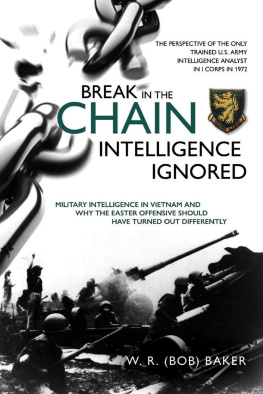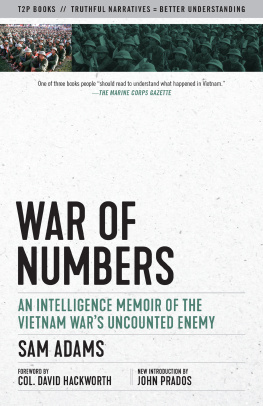A LSO BY T RACY K IDDER
Mountains Beyond Mountains
Home Town
Old Friends
Among Schoolchildren
House
The Soul of a New Machine
Copyright 2005 by John Tracy Kidder
All rights reserved.
Published in the United States by Random House, an imprint of The Random House Publishing Group, a division of Random House, Inc., New York.
R ANDOM H OUSE and colophon are registered trademarks of Random House, Inc.
A portion of this work appeared in the Fall 1996 edition of TriQuarterly.
Library of Congress Cataloging-in-Publication Data
Kidder, Tracy.
My detachment / Tracy Kidder.
p. cm.
eISBN: 978-1-58836-458-6
1. Vietnamese Conflict, 19611975Personal narratives, American.
2. Kidder, Tracy. I. Title.
DS559.5.K5 2005
959.70434092dc22 2004061465
[B]
www.atrandom.com
v3.1
For Judith Fuller, David Riggs, and Sam Toperoff
A UTHORS N OTE
My Detachment is a personal history. I have thought it appropriate to change many of the names of people in this book. In some cases I have changed other identifying characteristics.
The following names are pseudonyms: Colonel Chamberlain, Major Great, First Sergeant Harb, Melvin Harris, Mr. Hatfield, Higgins, Joanie, Lieutenant Johnson, Colonel Robert Mahoney, Mary Anne, Nat, Lieutenant Stan Pease, Lieutenant Colonel Dean Riddle, Rose, Mike Rosenthal, Schulzie, Sergeant Stoney Spikes, and Tex.
SUNDAE and SORTIE are invented code words, replacing the actual ones.
Special thanks to Stuart Dybek, Kate Medina, and Richard Todd.
Thanks also to the Rockefeller Foundation
for a residency at the Bellagio Study and Conference Center,
where a draft of this book was completed.
W AR S TORIES
I AM THE AUTHOR OF I VORY F IELDS , A NOVEL . I WROTE IT SOON AFTER I came home from Vietnam. Not many have read the book. After thirty-three publishers turned it down, I lit a fire in a trash barrel behind a rented house in Iowa and burned up all my copies of the manuscript. Years and years went by, and the book became a part of my distant memories of being a soldier, memories that would creep up on me when I was washing dishes or turning a key in a lock, memories that I wished away. Then one morning another copy of the novel arrived in the mail, from an old friend who was cleaning out his files, and I realized I was glad to have it back. From time to time I look at it, and I think.
The protagonist of Ivory Fields is a strange, doomed young Army officer named Larry Dempsey. Hes a second lieutenant, just as I was when I arrived in Vietnam in June 1968. But Lieutenant Dempsey is sent to Vietnam to lead an infantry platoon in combat. Whereas I commanded, in a manner of speaking, a detachment of eight enlisted men who performed an indoor sort of job, a classified mission called communications intelligence, in support of the 198th Light Infantry Brigade of the Americal Division. We belonged to the Army Security Agency, but in Vietnam we worked under the false though actually more descriptive name Radio Research.
I imagine this disguise was meant to confuse not only our enemies but also our friends who didnt have proper security clearances, but I dont know what difference it made. Our compounds were off limits to most American soldiers, and we never saw the Vietcong or North Vietnamese. At higher headquarters in Chu Lai and in small airplanes, other radio research soldiers listened in on the enemys encrypted Morse code communications, and what they learnedmainly locationswas passed to my detachment, and passed on by me to the brigade commander. I remember an article in an overseas edition of Time that accurately described what units like ours were doing. I read the article in my hootch, in my detachments compound, which was tucked inside the brigades fortified base camp, Landing Zone Bayonet. The camp was situated at the edge of the coastal plain, at the base of the foothills of the central highlands, in the part of South Vietnam that the American authorities had labeled I Corps. I spent most of my year at LZ Bayonet, inside the perimeter.
I remember watching a small group of American soldiers head out one evening. The selections that memory makes often puzzle me, but I probably remember seeing the patrol because it was the closest I ever got to the infantry in Vietnam. I was standing on the hill near my detachments antennas. I could see most of the base camp and to the west, out beyond the bunkers and barbed wire, green hills with taller hills like a wall behind them, and on a rock face in white paint, ALPHA 1/46 THE GUN-FIGHTERS , the name of an infantry company that must have passed through in the course of the war and left that memento behind. The sun was setting on the hilltops, below great-chested clouds, and I was gazing out that way, glad to be apart from my men for a while, when I caught sight of the infantry patrol on one of the intervening hills, a group of olive-drab figures in procession, tiny at that distance, humpbacked beneath rucksacks. It would be dark soon. They were trudging away from the camp at an hour when I would have wanted to be heading in the opposite direction, toward hootches and beer and cots and mosquito nets and generators.
I had decided that this war was wrong. Not because of anything I had read recently or because of what I had seen so far. I opposed the war mainly because a lot of my friends were protesting against it back home. I watched the patrol with morbid fascination, with something like the feeling I used to get as a boy when Id inch toward the edge of the roof of my grandmothers apartment building in New York, until the soldiers went over the hill in single file and disappeared.
I was glad I wasnt going with them. But what if I had to? What if I enraged some field grade officer and for punishment got reassigned to the infantry? A fluttery sensation passed through my chest, and for a moment my hands felt weak. I imagined my civilian friends watching me. I imagined my girlfriend, Mary Anne. She might approve of my being less than gung ho, but not homesick and frightened. I had let some of those feelings slip into a few letters, and she had written me a sweet but keep-your-chin-up letter in which shed said, Dont be so paranoid. Id be more careful from now on. Soon my letters would suggest a stoical, even at times heroic young fellow. And after all, here I was, standing on the edge of the dangerous highlands under an operatic Asian sky, in a situation she ought to find poignant, a reluctant commander drawing hazardous duty pay.
I wandered down the hill, past our latrine, toward the enlisted mens hootches, and turned in at the one we had made into our lounge. Outside the screen door, I heard beer cans hissing open. I went inside as usual. Five or six of my men were sitting around the TV set, awaiting that evenings episode of Combat! The title filled the screen: What Are the Bugles Blowin For? Sergeant Saunderss platoon has volunteered for a dangerous mission, which takes them, through the pouring rain, into a bombed-out village in France. The one kid left in the village joins up with them. He wants to fight the Krauts, too, because they killed his sister. He wants to get the man who did it, so he keeps checking the faces of the Krauts that Sergeant Saunderss squad guns down. Sergeant Saunders is brave and wise, and kind to children and women, especially nuns.













